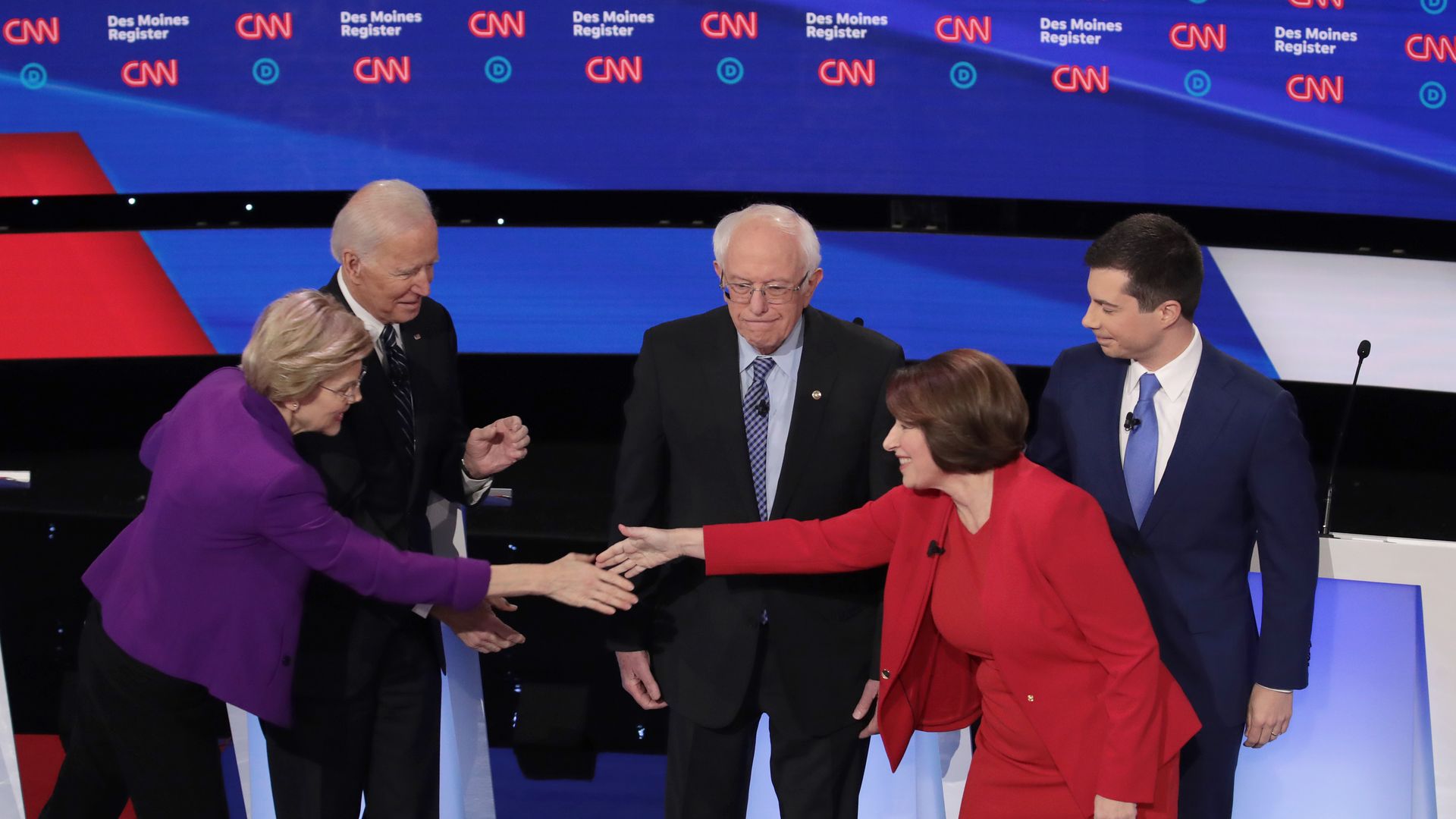4 takeaways from the 7th Democratic debate
Add Axios as your preferred source to
see more of our stories on Google.

Photo: Scott Olson/Getty Images
Six candidates squared off at Tuesday night's Democratic debate, which took place in Iowa but began with a global policy discussion on war and America's record in the Middle East.
The big picture: Recent tensions with Iran offered candidates the opportunity to draw sharp contrasts between their stances on foreign intervention. On more personal issues, like the rift between Sens. Bernie Sanders and Elizabeth Warren, the candidates were more subdued, emphasizing the importance of solidarity against President Trump with just three weeks until the Iowa caucuses.
Highlights
1. Foreign policy: Sanders predictably hammered former Vice President Joe Biden for his Iraq War vote, calling it “the worst foreign policy blunder in the modern history of this country."
- Biden admitted the vote was "a mistake" but stressed his role in the Obama administration helping to withdraw troops from the region.
- Warren returned to her anti-corruption campaign speech by condemning the "revolving door" between the defense industry and the Pentagon, while former South Bend, Ind., Mayor Pete Buttigieg emphasized his military experience and highlighted how there are currently more troops in Iraq than when Trump took office.
- The bottom line: Overall the conversation was tame but substantive, with every candidate agreeing that the United States must return to the Iran nuclear deal in order to ease tensions and prevent Iran from gaining a nuclear weapon.
2. Warren v. Sanders: Sanders was asked to respond to an explosive claim that he told Warren in 2018 that a woman couldn't win the presidency. Sanders scoffed and flatly denied the claim, noting that Hillary Clinton won 3 million more votes than Trump in 2016.
- Warren countered that she had no desire to spar with Sanders, before adding: “Look at the men on this stage. Collectively, they have lost 10 elections. The only people on this stage who have won every single election that they've been in are the women, Amy and me!"
- The big picture: The exchange was a microcosm of a broader debate about "electability." But Iowa voters whom Axios spoke with don’t look at gender as a signifier of electability, and are more likely to reach for qualities like truth-telling and candidates' willingness to work across the aisle.
3. Trade: Support for the United States-Mexico-Canada Agreement (USMCA) marked a rare area of daylight between Sanders and Warren.
- Warren, Buttigieg and Sen. Amy Klobuchar back the trade deal as an improvement over NAFTA, billing themselves as pragmatists rather than ideologues. Sanders argues the deal lacks key climate change protections, rebuffing calls to pass the agreement from influential labor leaders like AFL-CIO President Richard Trumka.
- Between the lines: The trade dispute between Sanders and Warren was relatively polite. Those anticipating a clash between the two progressives left empty-handed.
4. Health care: Medicare for All returned to the debate stage for the first time in 2020 and the final time before the Iowa caucuses, with moderates Biden, Klobuchar and Buttigieg renewing attacks on their progressive rivals over costs and candor.
- Buttigieg, whose surge in Iowa has come at the expense of Warren, called Medicare for All expensive and politically impossible. Klobuchar pointed out that the Affordable Care Act is 10 points more popular in the U.S. than Trump.
- Why it matters: Warren lost momentum earlier in the race after publishing specifics about her health care plan, but remained committed to defending the principle of single-payer on the debate stage. When it comes time for Iowans to vote, she'll likely live or die by that decision.
The bottom line: Billionaire Tom Steyer said in the final 10 minutes, “We’re going to have to beat [Trump] on the economy” — raising the question of why the candidates debated literally everything else for the first hour and 50 minutes.
Go deeper:
- Debate night: Candidates' last chance before nation's first presidential contest
- Buttigieg: Trump will have to stand next to an American war veteran
- Klobuchar: Obamacare is more popular than Trump
- Biden: "I would leave troops in the Middle East"
- Sanders and Warren clash on North America trade deal
- Sanders: I never told Warren a woman could never be president
